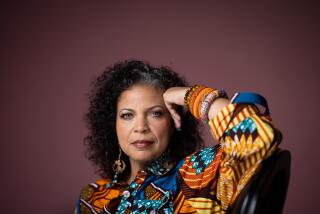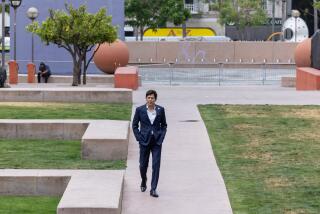Bradley Strategy on Farrakhan
President John Mack of the Urban League of Los Angeles continues to defend (Opinion, Oct. 20) the strategy of silence that he and others fashioned for Mayor Tom Bradley in the face of minister Louis Farrakhan’s visit to Los Angeles. That is regrettable. The strategy was to issue no statement before Farrakhan spoke and attempt instead to have Farrakhan “moderate” his remarks while in Los Angeles. It was a strategy guaranteed to fail because it was based on the premise that an acceptable level of rhetoric could be negotiated with a hate monger.
Only weeks before his visit to Los Angeles, Farrakhan called the U.S. government the most immoral government in the world, attacked all whites, including all Christians, and called for the assassination of elected black public officials.
Many leaders had no difficulty in condemning Farrakhan before he spoke. They include Los Angeles City Councilmen David Cunningham and Gilbert Lindsay and Mayor Edward Vincent of Inglewood, each of whom is black.
Mayor Bradley’s strategy was forged over objections within his own staff to protect the mayor’s standing in the black community. In short, it was motivated by political considerations. The Jewish community was informed of the mayor’s commitment to pre-speech silence only after the fact. Thus the primary targets of Farrakhan’s rantings were excluded from the formulation of the strategy.
Mack belatedly tries to justify the failure to condemn Farrakhan before he spoke by invoking the First Amendment and asserting it was “inappropriate to pre-judge his speech before he spoke it.” Mack and others previously defended their refusal to reject Farrakhan outright on the ground that they subscribed to his economic message even though they rejected his anti-Semitism.
If the grand dragon of the Ku Klux Klan visits Los Angeles with his well-known economic salve for poor whites and penchant for gutter attacks upon blacks, would Mack buy into a strategy of white leaders to remain silent, try to negotiate an acceptable level of filth, and speak out only if the grand dragon runs true to form while in town? Would they find comfort if responsible whites disowned the message of hate while embracing the klan’s economic program? Putting it another way, would it be all right if I gave $5 when the hat was passed and left just before the cross-burning?
Mack’s article is significant because it does not deal with the political reasons behind the decision to remain silent, and ignores the filth that Farrakhan visited upon us while in Los Angeles.
Instead, Mack questions the strength of the black-Jewish coalition in our community and implies that the differences on this issue are simply differences of opinion akin to those on questions of affirmative action, school desegregation and Israel’s relationship with South Africa. These passing references to such matters detract from the issue of how to deal with Farrakhan. They are also unfair.
Perhaps Mack knows of another ethnic community that has done more than the Jewish community to advance the cause of equal opportunities in housing, employment and education. I don’t. And perhaps Mack is concerned about the trade of the Arab nations and of black Africa itself with South Africa, each of which dwarfs that of Israel. If so, he neglects to mention it.
The presence of a hate monger in our midst, whether black or white, is not a subject for negotiation. Silence by responsible members of any community only invites and emboldens those who seek to divide us. When the silence envelops leading public officials and their closest advisers, it is a time for concern.
MARSHALL B. GROSSMAN
Los Angeles
Grossman is chair of the Community Relations Committee of the Jewish Federation Council of Greater Los Angeles.
More to Read
Sign up for Essential California
The most important California stories and recommendations in your inbox every morning.
You may occasionally receive promotional content from the Los Angeles Times.










